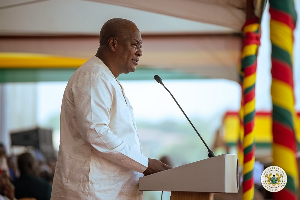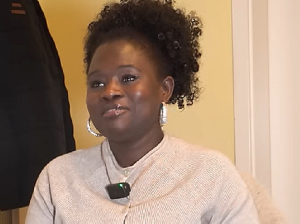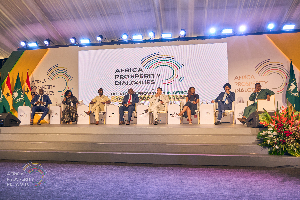Written in memory of John Mensah Sarbah, the First Ghanaian Lawyer
The current electoral process which, generally, but invariable, returns a government with a large majority of seats in parliament, asserts British Lord Hailsham, the Lord Chancellor in the 1979-87 parliament, contributes an elective dictatorship [1976] 120 SJ 693. It could even be threatening where the judiciary suffers judicial-parkinson disease in its rulings. And a politically arrogant executive controls a rubber-stamping parliament.
In such turbulent waves, as experienced in the past, most draft bills introduced to the House for debate could hardly be defeated even where there were good reasons for doing so. This arguably, could be that members might adhere to strict party discipline during voting which could leave potential laws, with a lot of loopeholes, especially, where it lacked the internal party criticisms, public opinion and objective parliamentray scruitiny.
As we all know, in the UK, unilike in Ghana, governments irrespective of the size of its majority of seats in parliament, are dependent upon parliament for its continuance in office. So loss of vote of confidence on a matter of policy central to a government's programme will cause it to fall, as occured in 1979 when the Labour Prime Minister, Mr Callaghan, was forced to seek a dissolution of parliament and call a general election.
Parliamentary proceedures are devised to secure adequate scrutiny for legislative proposals, so we can assume that government will not always secure a leeway legislation in the form which it envisaged. A convention that we probably need after decades of parliamentry cum executive dictatorship that undermined the inherent powers of the judiciary? That bills rolled freely on the legislative and executive band with little or no judicial hinderance? As was in the First and Second Republics where the sad politics of animosity and vegeance maimed and fractured the judiciary?
For example, while the Public Order Act 1961 permitted the imposition of curfews and regulated the control of public meetings, processions and posession of arms and ammunition, the Emergency Powers Act 1961 permitted the President to declare with the cabinet?s approval, a state of emergency in any part of Ghana where he deemed it fit in the interest of the State? He could detain or restrict any person or deport or excluded alien and take control of their property. The infamous Preventive Detention Act of 1961 armed the President to detain any citizen of Ghana for not more than five years without trial. Such incarceration was subject to extension for another five years period at the President?s discretion, contrary to s.13(1) of the 1960 Constitution?
These confirm what Lord Halisham describes as majoritarian dictatorship. Thus, the impact of general elections of December 1992, that Progressive Alliance- composed of the National Democratic Congress, the National Convention Party and the EGLE Party which won 198 seats out of a total of 200, cannot be ignored. The worry being the boycott of the main Opposition party- the National Patriotic Party and three others- namely, PNC, NIP and PHP - against the backdrop of a country whose draft constitutions had always been written in haste and water down in peace and patches?
The most similar impass being the election of our current Speaker of Parliament? Could it not be more pressing where the courts fail in its gaps-filling task which might have come as a result of ideological considerations? Lord Denning MR, has reasoned, and it is true that: "?the court, having discovered the intention of Parliament and of Ministers too, must proceed to fill the gap. What the legislature has not written, the court must write... It appears to me to be a naked usurpation of the legislative function under the thin disguise of interpretation. And it is less justifiable when it is guesswork with what material the legislature would, if it had discovered the gap, have filled it in. If a gap is disclosed, the remedy lies in an amending Act." (Denning, 1979, pp 13-14)
However, this 'closing-up' has its critics. In Magor and St Mellons Rural District Council v Newport Corporation (1965), Denning LJ was accussed by Lord Simonds in the House of Lords of 'naked usurpation of the legislative function'. Viscount Henry St John Bolingbroke (1678-1751), in Remarks on the History of England, argues that protection of liberty and security within the state depended upon achieving and maintaining an equilibrium between the Crown, parliament and the people. Thus, any confusion tends to destroy it (1748, pp. 80-83). It follows that in a constitution like ours, the safety of the whole depends on the balance of the parts.
Geoffrey Marshall, however, states that the phrase 'seperation of powers' is 'one of the most confusing in the vocabulary of political and constitutional thought'. This is because it has been used 'with varying implication' by historians and political scientist, and that the concept manifest itself in many arenas: ... judicial independence, delegation of legislative powers, executive responsibility to legislatures, judicial review, and constitutionality of arbitral bodies with mixed functions.' (1971, p. 97)
In Ghana now, as demonstrated since the restoration of democratic rule in 1993, legislative creativity appears to be wandering through learning curves? Do we still perceive our legislators far more as road contractors and far less as lawmakers? Yes, they should be allowed to carry their own Cross for their promises. But may we not be denying ourselves the legislative know-how, say, through research and probably introducing, for example, a bill on matters that affect our livelihood?
Take Environmental Concious Mining Bill, that might not only protect our forests, soils, waters and atmosphere which we could hardly afford to plunder in impunity without a shred of thought of posterity? Do all these, among others, radiate not years of parliamentary experience and mutual bi-partisan approach?
In the UK, the opposition is not only to question, challenge and oppose the government, but it also puts forward alternative policies and solutions to problems. To ensure that there is adequate opportunity for it to filfil its constitutional role (as provided in Standing Order No. 13), 20 days per session are set aside for debate on subjects chosen by the Opposition. Here, we may be able to evaluate the alternative measures of our Minority. Whether or not for example, it agrees to a bill that intends to reactivate Asutuare Sugar Factory- the only state-owned firm in Osudoku, whose lands now sliced in loaves for peasant rice-farming? And what about the Estates?
For example, in 1983-84, the Police and Criminal Evidence Bill, according to Barnett was substantially amended following pressure from politicians of all parties, pressure groups, academics and lawyers. In 1994, the British Conservative government lost a vote on an increase in the level of VAT on domestic fuel in the European Finance Bill, when eight of its members supported the Opposition and a further seven members abstained. As a result, the Chancellor of Exchequer immediately, dropped the Bill and the requisite revenue raised through mini budget (Barnett, H., (2003) pp 108-133). We subscribe not to its abuse, but when objectively applied, it seems, might be able to control some of these CNTCIWahalas and parliamentary deadlocks.
Thanks in part to Chief Justice George Acquah. Holding Yes, the EC can create constituencies and the constituencies come into effect for the impending general elections, the Ghanaian Law Lord said: "We are convinced that as the highest court of the land, charged with the constitutional authority to interpret and enforce the Constitution, and thereby promote rule of law in our society, we should, in fitting situations, rise up to the occasion and determine disputes like to endanger our infant democracy. And we would do this, if the subject matter falls within our jurisdiction and the [legislative?] procedural errors committed by the [executive?] plaintiff are not so fundamental as to amount to a denial of our jurisdiction..." (http://www.ghanaweb.com/law_cms/article)
A court that decide on highly political issues often come under criticms both from the public and the politicians. And the Supreme Court is not an exception. Consider for example, what the former Attorney-General, Nana Akufo-Addo has stated: ?The principal methods employed in Ghana over the last two decades to deal with corruption, ostensibly revolutionary in origin, including in some instances the summary executions of national leaders decreed by so-called People's Courts, with masked "judges" sitting in secret... reflected little credit on Ghanaian justice, have ended in conspicuous, glaring failure, amid strident accusations of hypocrisy and double-standards levelled against their authors. The all-pervading, almost endemic, stench of corruption- laments Aberewa Dokua nana Dankwa, testifies eloquently to the failure of these simplistic, anarchic efforts.? (Ghanaweb, ?The role of Lawyers in Consolidating Democracy in Africa?, Law Discussions Forum, posted, 29/ 04/05)
But could the pendulum not have swung back to redress the balance? There is another celebrated authority. Thus, in a plain veil decision of the judges against Prime Minister Dr Kofi Busia?s measure to reduce the number of aliens in Ghana, the PM said No, threatened the judiciary and actually deported the alleged aliens. This, our learned brother Adigwe, Solicitor and Advocate at the Supreme Court of Nigeria, describes as hasty and cruelly implemented (Adigwe, F., (1975), p.166).
However, our learned Foreign Minister rained on some dry soils worth ploughing: ?...We can no longer ignore the persistent and pervasive criticisms of our conduct and performance.... slow, tardy, corrupt justice.... There are many juniors practising under trees out of their briefcases for want of chambers; declining standards of advocacy and legal service; inefficient registries; primitive court-rooms, facilities and procedures...The time has come for all of us in the profession - the teacher, the scholar, the private practitioner, the state attorney, the judge, the administrator, the conveyancer, ...to make a concerted effort to change this image and ensure the reform of the legal system so that it can deliver an improved quality of service to our people.?
Image is the catchword in this afternoon sermon. These decades of racing coaches and horses through the fine terrace of justice and fairness, perhaps, did flutter the pendulum too far in favour of lawbreakers and exploiters? There could be no better illustration to confirm any answer to this question than what Mr Charles Bamfo Nimako, the Kyebi District Magistrate, has recently revealed: ?... justice had been on sale in the country for a long time... (Ghanaweb, 16 Sept. 2003).
This is the knell around our necks. You may be pondering over these injustices. Thus, could there be anything the judges might do as some courts bind themselves or depart from their earlier decisions? Retrospectively, probably, no, because that might sprout unwanted seed in our legal system. The best they could do, probably, we presume, is to overrule suspicious decisions whenever the opportunity arises?
Yes. But could our Honourables who preside over Oaths of Truth be so unfair and corrupt? Griffith says, so. Judges [lawyers and journalists?], being human, may be biased by virtue of race, sex, politics, background, association and opinions (Griffith 1991). However, when adjudicating they must be demostrably impartial.
This impartiality, involves the judge listening to each side with equal attention, and coming to a decision on the argument, irrespective of his/her personal view about the litigants. Thus whatever the judge?s personal beliefs, per Bell, s/he should seek to give effect to the common values of the community, rather than any sectional system of values to which s/he may adhere (Bell, 1983, pp. 4 and 8).
In Dr Bonham's Case (1609) Lord Coke held that members of a board which determined physicians' fines could not both impose and receive the fines. Thus, giving early judicial expression to freedom from bias. In Dimes v Grand Junction Canal Properties (1852), the propriety of Lord Cottenham LC adjudicating was challenged because the Chancellor held shares in the company involved in litigation. The House of Lords set aside the decision of the court despite the fact that: No one can suppose that Lord Cottenham could be in the remotest degree influenced by the interest... affirming the maxim that no man is to be judge in his own cause (p. 793).
This explains that the mere existence of financial interest, even where it does not in fact result in actual bias but may present the appearance of bias will be sufficient to diqualify a judge from adjudication. The same position prevail in the United States of America (28 USC ?455(b)), where the issue of financial interests of federal judges is expressly covered by law. The Ethics in Government Act 1978 requires that Supreme Court and Federal judges must make a public declaration of 'income, gifts, shares, liabilities and transactions in securities and real estate' (Cranston, 1979), a protection absent in Ghana?
But financial interest in a case which does not go beyond the financial interest of any of other citizen does not disqualify judges from sitting. In Bromley London Borough Council v Greater London Council (1983), the fact that all judges in the Court of Appeal were taxpayers and users of public transport in London did not disqualify them from hearing the case
So whatever might have been our misfortune, our current climate offers the judicial service a renewed image to shake the dust under their feet. This imply that lawyers too are not only to invoke purposive interpretation to laws but also question the legal base of judicial decisions? Meaning a possible jury misdirection which resulted in miscarriaged of justice? Or to exploit the defects in the law, thus not well argued out in court? Including statutes and legislations or divinng deep seas to fish out the hook- the judge?s interest in the case, as was in General Pinochet?s ruling? Hmm, oyiwa, aba Kade...
Gibb has stated: "The Pinochet Case, a unique and unprecedented case which brought the highest domestic court under public scrutiny, spawned further challenges against English judges, alleging bias of one form or another. It also led to calls for a register of judges' interests, in which might raise the question of bias could be recorded and made public. A proposal rejected by Lord Bowne-Wilkinson as unworkable: whereas it was generally clear when MP?s interests conflict with their professional duties.. a judge may be dealing with anything, any local club ... there's no end to it (1999, p. 3).
Thus in 1989, whilst in Britain, the Spanish government sought for the arrest and extradiction of the former Dictator on charges involving human rights abuse between 1973 and 1979. At first instance, the Queen's Bench Division ruled that the Senator enjoyed sovereign immunity as a former Head of State, see ex parte Pinochet Ugarte. On appeal to the House of Lords, it was held by a majority of three to two judges that murder, torture and hostage-taking- were not covered by the immunity clause.
His lawyers grumbled before the Home Secretary that one of the judges, Lord Hoffmann, had links with the Amnesty International Charitable Trust. So what, for a man whose regime came almost closer to that of Pol Pot, one may ask. But that was not the wood of the tree to defence lawyers. Rather on Hoffmann LJ's participation and probability of bias: of judge 'sitting on his own cause'. Accordingly, the General succeeded in his application since Lord Hoffmann had been one of the three majority judges.
Lord Brown-Wilkinson, the most senior of the 12 Law Lords, convened a differently constituted panel of judges to reconsider the case. And to our dismay[?], all the five judges agreed that the earlier decision could not stand. Browne-Wilkinson LJ, said that it was 'of fundamental importance that justice should not only be done, but should manifestly and undoubtedly be seen to be done', per Lord Hewart in R v Sussex Justices ex parte McCarthy (1924), p. 259. Thus, once it was shown that the judge was himself a party to the cause, or had a relevant interest in its subject matter, he was disqualified without any investigation.... of bias, Re Pinochet Ugarte (1999), (see Olowofoyeku, 2000).
The fundamental doctrine of natural justice in English law of which we subcribe to, is that 'no man should be judge in his own cause': nemo iudex in sua causa. For these reasons, judicial salaries in the UK, are relatively high, in that it is in the national interest 'to ensure an adequate supply of candidates of sufficient calibre for judicial office (HC Deb Vol 23 Cols 257-61). To this effect, Courts and Legal Sevices Act 1990, s.75 and Sched 11, provide that full time judicial appointees are barred from legal practice, and may not hold paid appointments as directors or undertake any professional or business work. And though nominated, but not removable at pleasure by the Crown. In reality, it seems the judiciary is a very powerful arm of government as politicians come and go.
The Audi Alterem Partem rule also require the right to a fair hearing on cases that affect us personally. In recent times, the English courts restricted natural justice to decisions taken by court like bodies. In Ridge v Baldwin (HL, 1964) the Chief Constable of Brighton was dismissed from office by the Brighton Watch Committee without an adequate hearing. It was recognised that the decision clearly affected the Chief Constable's legal rights for no better reason than that it would affect pension rights.
In Associated Provincial Picture Houses v Wednesbury Corporation [1948]1 KB 233, Lord Greene explained at p. 229 that a person entrusted with a discretion must.. direct himself properly in the law. He must call his own attention to the matters which he is bound to consider. He must exclude from his consideration matters which are irrelevant to what he has to consider. If he disobeys these rules, he may truly be acting 'ureasonably. Could this imply that our courts might be at pains if they were to wake up to read that the executive had fired, say, some 150 workers without fair hearing?
What could be said of the judiciary itself, assuming the references attributed our learned brother, Nana Dankwa Akufo-Addo, tend out to be willfully false and the courts uphold for instance, a legal hammer of say, 500 million cedis on the head of this this writer, who has no authoritative words of his own? Where our Lordships know that apart from being at ease with a few dollar car loans for our Honourables, the state had been on the wilderness in contracting a huge cedis to shuffle our ?National Zoo? at the back of Flag staff House, to say, Game and Wildlife, at Shai Hills, near the frozen Quarry company?
Thus, where governments, recipients of state revenues cannot conjure such funds to reinstall for example, the said broken down telephone booths which, once upon a time, decorated our only Accra- Tema Motorway, where we could still plant some beautiful trees or flowers along the high way and on the pavement and to give job to the youths, why could the courts enforce such damages on Kwame, who owns not even a matches box? Better illustrated where the judiciary itself is tasty for such monies to embark on the said needed reforms that Nana talks about? Could this therefore, not be harsh and irrational in equity?
Yes, smothering lawbreakers and disparagers in cotton wool could be dangerous. Yet, it seems, it is because of some of these harsh common law principles that equity and irrationality have emerged. Lord Dipplock employed the term 'irrationality' to describe 'Wednesbury in the Council of Civil Service Unions and others v Minister for the Civil Service the (GCHQ Case) [1984] 3 All ER 935 to explain that it applies to a decision so outrageous in its defiance of logic or of accepted moral standards that no sensible person who had applied his or her mind to the question to be decided could have arrived at it'. Warrington LJ in Short v Poole Corporation ((1926)) Ch 66, 90, 91 gave the example of the red-haired teacher dismissed because she had red hair. That is unreasonable in one sense that it might almost be described as being done in bad faith?
But we must venture with caution. Thus public policies are for determination by the executive, and not for the judiciary. In Hammersmith and Fulham LBC v Dept. of the Environment (1991), House of Lords ruled that the decision was not open to challenge. Lord Bridge emphasised that such decision, relating to national economic policy, are matters depending on political judgement and that, in the absence of any evidence of bad faith, or abuse of power, the courts would be exceeding their proper function if to condemn the policy as unreasonable.
Besides the fact that the courts will consider it inappropriate to intervene in matters of public policy, for example, national security, grant of honours and disputes involving the making of treaties, executive powers ought to be exercised proportionally to the result to be achieved. The principle of proportionality in European Community Law is concerned with balance and whether the means justify the ends. And has been described by the Committee of Ministers of the Council of Europe in 1980 as follows: Thus an appropriate balance must be maintained between the adverse effects which an administrative authority?s decision may have on the rights, liberties or interests of the person concerned and the purpose which the authority is seeking to pursue.
In R v Medical Appeal Tribunal ex parte Gilmore [1957], the statute provided that the decision on any medical question by a medical appeal Tribunal is final. Gilmore lost the sight of both eyes in two accidents and was assessed at a disablement of 20 per cent. The tariff provided that the lost of sight in both eyes entitled the applicant to 100 per cent assessment. The Tribunal made an error of law. However, to redress the wrong turned on the exclusion of the review in the statute. The Court of Appeal held that the jurisdiction of the court is not ousted by the statutory words.
Denning LJ stated that the remedy of certiorari is never to be taken away by any statute except by the most clear and explicit words. The word ?final?, is not enough. That only means ?without recourse to certiorari?. It makes the decision final on the facts, but not final on the law. Notwithstanding that the decision is by a statute made ?final?, certiorari can still issue for excess of jurisdiction or for error of law on the face of the record (p. 583). See, South East Asia Firebricks v Non-Metallic Mineral Products Manufacturing Employees? Union (1981).
Despite attempt to achieve clarity in statutory language, it is artificial to deny that judges 'make law'. Every new meaning conferred on a word, every application of a rule to a new situation, according to Barnett (Ibid), whether by way of statutory interpretation or under common law, 'creates' new law. And it appears that English judges have nowadays abandoned the fiction of the 'declaratory theory' which asserts that they do not 'make' laws but merely discover its true meaning. This could be crucial in a majoritarian rule, where there is little incentive to accomodate the official Oppostion or pressure groups.
President Kufuor is quoted in his maiden address to Parliament on the state of the nation on 15 February 2001 as saying: "The rule of law should be the guiding principle in all our dealings and that no one is seen to be above the law. When every body feels safe under the law, our focus on creating wealth and eradicating poverty in our nation will move apace and gather irreversible momentum."
This, in the words of Nana Akufo -Addo, must never be compromised, no matter who is in power (Ibid.) And no matter which party commands parliamentary majority? So the judicial hammer is firmly in the hands of our judges to prove our frustrations and that of the Police Service false. We plea for: Equity, fairness and proportionality- Your Honour.



















